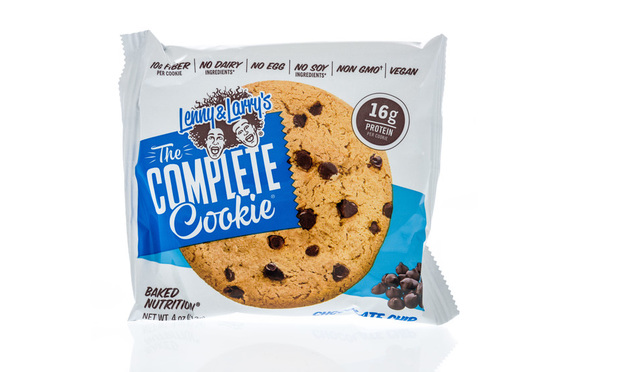Lawyers in Cookie Settlement Find New Recipe for Success
A federal judge has approved a class action settlement over Lenny & Larry's cookies after the U.S. Department of Justice stated that the original deal gave too much to lawyers and not enough cash to class members.
May 09, 2019 at 07:42 PM
5 minute read
The original version of this story was published on Law.com
 Lenny and Larrys protein cookies.
Lenny and Larrys protein cookies.
A federal judge gave final approval to a class action settlement over Lenny & Larry's cookies after the U.S. Justice Department insisted that the lawyers should sweeten the deal for class members.
The DOJ had filed a statement of interest in the case objecting to the $1.2 million in attorney fees and expenses, which made up most of the cash portion of the deal, particularly since each class member would receive up to $50 cash and $30 worth of cookies. The revised settlement, valued at $2.3 million, down from the original deal's estimate of $5 million, gave more cash to consumers, while plaintiffs lawyers cut their fee request to $410,000.
On May 2, U.S. District Judge Robert Gettleman of the Northern District of Illinois approved the amended settlement and attorney fees, which are due in 30 days.
“Throughout this litigation, Lenny & Larry's denied liability, and the judge repeatedly granted motions to dismiss,” Robert Wallan, of Pillsbury Winthrop Shaw Pittman's Los Angeles office, who represents Lenny & Larry's Inc., said in an emailed statement. “But class actions like this are expensive and uncertain. The class action lawyers' fees dropped sharply in light of the agreement amendments, which we see as a good outcome.”
Plaintiffs' attorney Edward Wallace, of Wexler Wallace in Chicago, did not respond to a request for comment.
Kelly Laco, a spokeswoman for the Department of Justice, which filed a statement of interest April 16 supporting the revised agreement, declined to comment. But, at the time that lawyers filed the revised settlement last month, Assistant Attorney General Jody Hunt, of the Department of Justice's civil division, released a statement praising the new deal.
“The Class Action Fairness Act is designed to help ensure that class action settlements do not unreasonably benefit attorneys or third parties at the expense of the consumers involved,” he said. “The Department of Justice will continue to take action when we see unsuitable class action settlements.”
Separately, the DOJ also filed a Feb. 4 amicus brief challenging a settlement over allegedly defective Tristar pressure cookers that gave $2.3 million to plaintiffs attorneys and discount coupons to class members. The Arizona Attorney General's office, joined by 17 other states, has petitioned the U.S. Court of Appeals for the Sixth Circuit to unravel that deal.
The cookie case alleged that Lenny & Larry's, based in Panorama City, California, mislabeled the protein content on the packaging of all 11 flavors of its product, The Complete Cookie. After several amended complaints, which reduced the size of the class, the settlement compensated customers nationwide.
Gettleman gave preliminary approval of the settlement Nov. 1, but the DOJ filed a statement of interest Feb. 15.
The DOJ can challenge class action settlements under the Class Action Fairness Act of 2005 but, until last year, has declined to do so. That's when former Associate Attorney General Rachel Brand said the DOJ would be more aggressive in pinpointing class action settlements with problems.
Soon afterward, government lawyers filed a statement of interest urging a federal judge in New Jersey to reject a settlement that would have given nearly $2 million in fees to plaintiffs lawyers and vouchers to class members in a case alleging false pricing advertisements on the website Wines Til Sold Out. U.S. District Judge Renee Bumb of the District of New Jersey rejected the deal, but after the DOJ withdrew its objection.
In the original settlement with Lenny & Larry's, the DOJ estimated only $350,000 in cash went to the class members, and suggested that fees should be in the range of $228,000 to $463,000. The government was particularly critical of a provision that gave potentially $3.15 million in free cookies to General Nutrition Centers Inc. and The Vitamin Shoppe in the event that not enough class members make claims.
But class members made 66,647 valid claims by the Jan. 29 deadline. And the vast majority wanted cash, not cookies.
That unusually high claims rate—not the DOJ's objection—prompted lawyers to redraft the settlement, they wrote.
“The parties believed that despite their lengthy efforts to notify class members of the settlement, the notice program would not elicit a significant response,” Wallace wrote in an April 2 motion for final approval of the revised settlement. “However, based on the overwhelming response to the settlement program, the parties have amended the settlement to increase the benefits that go directly to claimants instead of distributing free products through third-party retailers.”
The new settlement provides a cash fund of at least $889,000, and each class member could receive up to $35 in free cookies.
It also grants $410,000 in fees and $37,000 in expenses to the lawyers.
In addition to Wallace, Nick Suciu of BMST Law Firm in Bloomfield Hills, Michigan, and Steve Wasserman of Wasserman Law Group in Tarzana, California, sought fees in the case.
Ted Frank, a class action critic who filed an objection that raised many of the same issues as the DOJ had about the Lenny & Larry's deal, said in an April 23 court filing that he had no problems with the revised settlement. He also said he would be seeking attorney fees for his work in the case.
This content has been archived. It is available through our partners, LexisNexis® and Bloomberg Law.
To view this content, please continue to their sites.
Not a Lexis Subscriber?
Subscribe Now
Not a Bloomberg Law Subscriber?
Subscribe Now
NOT FOR REPRINT
© 2025 ALM Global, LLC, All Rights Reserved. Request academic re-use from www.copyright.com. All other uses, submit a request to [email protected]. For more information visit Asset & Logo Licensing.
You Might Like
View All
Some Thoughts on What It Takes to Connect With Millennial Jurors

Litigators of the Week: A Knockout Blow to Latest FCC Net Neutrality Rules After ‘Loper Bright’
Trending Stories
- 1Loopholes, DNA Collection and Tech: Does Your Consent as a User of a Genealogy Website Override Another Person’s Fourth Amendment Right?
- 2Free Microsoft Browser Extension Is Costing Content Creators, Class Action Claims
- 3Reshaping IP Policy Under the Second Trump Administration
- 4Lawyers' Reenactment Footage Leads to $1.5M Settlement
- 5People in the News—Feb. 4, 2025—McGuireWoods, Barley Snyder
Who Got The Work
J. Brugh Lower of Gibbons has entered an appearance for industrial equipment supplier Devco Corporation in a pending trademark infringement lawsuit. The suit, accusing the defendant of selling knock-off Graco products, was filed Dec. 18 in New Jersey District Court by Rivkin Radler on behalf of Graco Inc. and Graco Minnesota. The case, assigned to U.S. District Judge Zahid N. Quraishi, is 3:24-cv-11294, Graco Inc. et al v. Devco Corporation.
Who Got The Work
Rebecca Maller-Stein and Kent A. Yalowitz of Arnold & Porter Kaye Scholer have entered their appearances for Hanaco Venture Capital and its executives, Lior Prosor and David Frankel, in a pending securities lawsuit. The action, filed on Dec. 24 in New York Southern District Court by Zell, Aron & Co. on behalf of Goldeneye Advisors, accuses the defendants of negligently and fraudulently managing the plaintiff's $1 million investment. The case, assigned to U.S. District Judge Vernon S. Broderick, is 1:24-cv-09918, Goldeneye Advisors, LLC v. Hanaco Venture Capital, Ltd. et al.
Who Got The Work
Attorneys from A&O Shearman has stepped in as defense counsel for Toronto-Dominion Bank and other defendants in a pending securities class action. The suit, filed Dec. 11 in New York Southern District Court by Bleichmar Fonti & Auld, accuses the defendants of concealing the bank's 'pervasive' deficiencies in regards to its compliance with the Bank Secrecy Act and the quality of its anti-money laundering controls. The case, assigned to U.S. District Judge Arun Subramanian, is 1:24-cv-09445, Gonzalez v. The Toronto-Dominion Bank et al.
Who Got The Work
Crown Castle International, a Pennsylvania company providing shared communications infrastructure, has turned to Luke D. Wolf of Gordon Rees Scully Mansukhani to fend off a pending breach-of-contract lawsuit. The court action, filed Nov. 25 in Michigan Eastern District Court by Hooper Hathaway PC on behalf of The Town Residences LLC, accuses Crown Castle of failing to transfer approximately $30,000 in utility payments from T-Mobile in breach of a roof-top lease and assignment agreement. The case, assigned to U.S. District Judge Susan K. Declercq, is 2:24-cv-13131, The Town Residences LLC v. T-Mobile US, Inc. et al.
Who Got The Work
Wilfred P. Coronato and Daniel M. Schwartz of McCarter & English have stepped in as defense counsel to Electrolux Home Products Inc. in a pending product liability lawsuit. The court action, filed Nov. 26 in New York Eastern District Court by Poulos Lopiccolo PC and Nagel Rice LLP on behalf of David Stern, alleges that the defendant's refrigerators’ drawers and shelving repeatedly break and fall apart within months after purchase. The case, assigned to U.S. District Judge Joan M. Azrack, is 2:24-cv-08204, Stern v. Electrolux Home Products, Inc.
Featured Firms
Law Offices of Gary Martin Hays & Associates, P.C.
(470) 294-1674
Law Offices of Mark E. Salomone
(857) 444-6468
Smith & Hassler
(713) 739-1250








